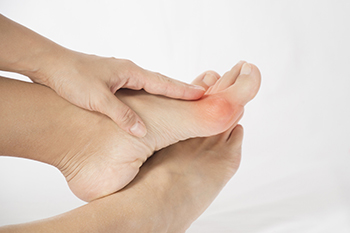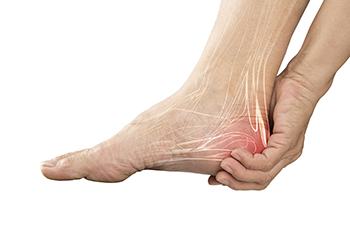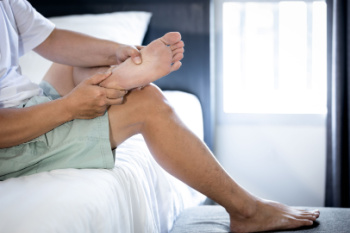
Bunions are a foot condition where the top of the big toe angles toward the second toe, and a bony bump forms at the base of the big toe. They often develop due to genetics, wearing tight or narrow shoes, arthritis, or foot stress. Symptoms include redness, swelling, and soreness surrounding the joint, as well as pain while walking or wearing shoes. The skin over the bunion may become thick and callused, and the toe can become stiff or difficult to move. Bunions can worsen over time, if left untreated, leading to increased discomfort and changes in foot shape. A podiatrist can diagnose a bunion through a physical exam and X-rays to assess its severity. Treatment includes custom orthotics, footwear changes, anti-inflammatory medication, and, in more severe cases, surgery to realign the joint. Early care can prevent further progression and ease discomfort. If you have a painful bunion, it is suggested that you schedule an appointment with a podiatrist for effective relief and treatment solutions.
If you are suffering from bunion pain, contact one of our podiatrists of Apple Podiatry Group. Our doctors can provide the care you need to keep you pain-free and on your feet.
What Is a Bunion?
Bunions are painful bony bumps that usually develop on the inside of the foot at the joint of the big toe. As the deformity increases over time, it may become painful to walk and wear shoes. Women are more likely to exacerbate existing bunions since they often wear tight, narrow shoes that shift their toes together. Bunion pain can be relieved by wearing wider shoes with enough room for the toes.
Causes
- Genetics – some people inherit feet that are more prone to bunion development
- Inflammatory Conditions - rheumatoid arthritis and polio may cause bunion development
Symptoms
- Redness and inflammation
- Pain and tenderness
- Callus or corns on the bump
- Restricted motion in the big toe
In order to diagnose your bunion, your podiatrist may ask about your medical history, symptoms, and general health. Your doctor might also order an x-ray to take a closer look at your feet. Nonsurgical treatment options include orthotics, padding, icing, changes in footwear, and medication. If nonsurgical treatments don’t alleviate your bunion pain, surgery may be necessary.
If you have any questions, please feel free to contact our offices located in Arlington Fort Worth, And Flower Mound, TX . We offer the newest diagnostic and treatment technologies for all your foot care needs.

Retrocalcaneal bursitis is a painful condition that affects the small fluid-filled sac located between the heel bone and the Achilles tendon. This bursa helps reduce friction, but when it becomes inflamed, every step can feel uncomfortable. The pain is usually felt at the back of the heel, especially when walking, running, or wearing tight shoes that put pressure on the area. Swelling, tenderness, and stiffness surrounding the heel are also common signs. The condition often develops from overuse, repetitive stress, or footwear that irritates the heel. Athletes and individuals who spend long hours on their feet may be more prone to bursitis. Treatment may involve rest, heel lifts, or changes in footwear to reduce pressure on the tendon and bursa. If pain persists, it is suggested that you see a podiatrist who can provide custom orthotics, targeted exercise, or other advanced treatments to restore comfort.
Many people suffer from bouts of heel pain. For more information, contact one of our podiatrists of Apple Podiatry Group. Our doctors can provide the care you need to keep you pain-free and on your feet.
Causes of Heel Pain
Heel pain is often associated with plantar fasciitis. The plantar fascia is a band of tissues that extends along the bottom of the foot. A rip or tear in this ligament can cause inflammation of the tissue.
Achilles tendonitis is another cause of heel pain. Inflammation of the Achilles tendon will cause pain from fractures and muscle tearing. Lack of flexibility is also another symptom.
Heel spurs are another cause of pain. When the tissues of the plantar fascia undergo a great deal of stress, it can lead to ligament separation from the heel bone, causing heel spurs.
Why Might Heel Pain Occur?
- Wearing ill-fitting shoes
- Wearing non-supportive shoes
- Weight change
- Excessive running
Treatments
Heel pain should be treated as soon as possible for immediate results. Keeping your feet in a stress-free environment will help. If you suffer from Achilles tendonitis or plantar fasciitis, applying ice will reduce the swelling. Stretching before an exercise like running will help the muscles. Using all these tips will help make heel pain a condition of the past.
If you have any questions, please feel free to contact our offices located in Arlington Fort Worth, And Flower Mound, TX . We offer the newest diagnostic and treatment technologies for all your foot care needs.

Plantar fasciitis typically causes heel pain, often felt after long periods of rest or first thing in the morning. This pain is caused by inflammation of the plantar fascia, a thick band of tissue running along the bottom of the foot. The plantar fascia supports the arch and absorbs shock when walking or running. Repeated strain can lead to tiny tears in the tissue, especially where it attaches to the heel bone. Over time, these tears result in inflammation and discomfort. Runners and athletes often experience worsening pain during exercise, and the condition can interfere with daily activities, if left untreated. Risk factors for plantar fasciitis include high-impact activities, wearing improper footwear, and abnormal foot mechanics. A podiatrist can diagnose the condition and recommend treatment options to alleviate the pain. If you experience heel pain during or after exercise or sports activities, it is suggested that you schedule an appointment with a podiatrist for expert advice and guidance.
Plantar fasciitis is a common foot condition that is often caused by a strain injury. If you are experiencing heel pain or symptoms of plantar fasciitis, contact one of our podiatrists from Apple Podiatry Group. Our doctors can provide the care you need to keep you pain-free and on your feet.
What Is Plantar Fasciitis?
Plantar fasciitis is one of the most common causes of heel pain. The plantar fascia is a ligament that connects your heel to the front of your foot. When this ligament becomes inflamed, plantar fasciitis is the result. If you have plantar fasciitis you will have a stabbing pain that usually occurs with your first steps in the morning. As the day progresses and you walk around more, this pain will start to disappear, but it will return after long periods of standing or sitting.
What Causes Plantar Fasciitis?
- Excessive running
- Having high arches in your feet
- Other foot issues such as flat feet
- Pregnancy (due to the sudden weight gain)
- Being on your feet very often
There are some risk factors that may make you more likely to develop plantar fasciitis compared to others. The condition most commonly affects adults between the ages of 40 and 60. It also tends to affect people who are obese because the extra pounds result in extra stress being placed on the plantar fascia.
Prevention
- Take good care of your feet – Wear shoes that have good arch support and heel cushioning.
- Maintain a healthy weight
- If you are a runner, alternate running with other sports that won’t cause heel pain
There are a variety of treatment options available for plantar fasciitis along with the pain that accompanies it. Additionally, physical therapy is a very important component in the treatment process. It is important that you meet with your podiatrist to determine which treatment option is best for you.
If you have any questions, please feel free to contact our offices located in Arlington Fort Worth, And Flower Mound, TX . We offer the newest diagnostic and treatment technologies for all your foot care needs.
